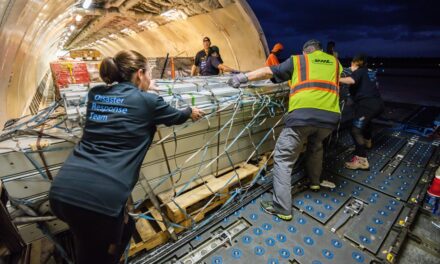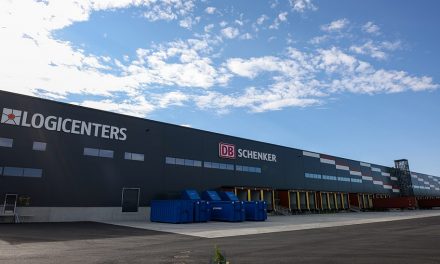
Change Maker

Post & Parcel speaks to Clare Bottle, CEO of the UK Warehousing Association, to find out how she plans to challenge the outdated perception of warehousing by raising awareness in schools, and discover why reducing the carbon intensity of buildings is key to the sector’s sustainability efforts.
Warehouses have been under a lot of pressure since the start of the pandemic – what have been the key obstacles?
One of the effects of the global pandemic was to shut down all ‘non-essential’ retail. This in turn affected warehouses serving ‘non-essential’ retail outlets. In some cases, stockholding was already higher than usual, as a result of companies holding more safety stock to guard against Brexit disruption. Warehouses were full, but the goods remained static. Those warehouse operators affected by the ‘non-essential’ measures struggled to survive, as profits in the sector are not usually derived from storage, but from throughput: handling and moving goods through the warehouse.
Another major effect was the exponential growth in online shopping, fuelled by a combination of new shopping patterns including short-term panic buying and longer-term reluctance to visit the shops in person. Retailers of products considered ‘essential’, such as food and pharmaceuticals, had to radically change their fulfilment strategies virtually overnight, finding new ways to forecast demand and get stock to their house-bound customers. Some used stores for ad-hoc fulfilment and click-and-collect or, as with the supermarkets, invested in new warehousing, relying more heavily on the support of 3PLs and expanding delivery fleets. Preparing goods for despatch to a consumer is more labour intensive than picking for delivery into stores, so there was an increase in job opportunities in warehousing.
The warehousing and logistics sector has risen to these challenges admirably, implementing new ways of operating to keep employees working, yet safe. Measures included split shifts, screens and safe working distances, hand sanitation stations, enhanced cleaning regimes and, where possible, staff working from home. The pressures on a low-margin industry of such investment have been immense, not to mention the toll taken by social distancing requirements on productivity and therefore profitability.
Many warehouses had to speed up modernization plans to respond to the pandemic – how will this benefit the sector?
In a Logistics Users panel discussion hosted by UKWA earlier this year, participating retailers and manufacturers had a clear message for their 3PL partners – namely, automation is no longer a ‘nice to have’, but a ‘must have’.
The emphasis was very much on the increased importance of automation in warehouses, as well as data security, and the key role for 3PL partners in the new, post-pandemic world.
For those who have invested in modernising in this way, the future looks very positive as we recover from lockdown and retailers ride the wave of pent-up demand.
As our recent report into the size and makeup of the UK warehousing market confirms, high grade warehouse space in the right location is still at a premium. What’s more, the trend is towards larger warehouses, reflecting the rise in ecommerce and driven by the likes of Amazon. So, those who expanded capacity during the pandemic – particularly in locations close to populous areas – can continue to expect high demand for space for the foreseeable future.
What are your aims for your role?
The twin challenges facing our sector are the labour and skills shortage, and the need to move towards more sustainable operations – this is what our customers demand and ultimately will be required by law.
On the labour and skills front, I am committed to growing more of our own talent. The problem with attracting people into the industry in the first place is that there is nothing about logistics and warehousing on the curriculum at school. Very few higher education institutions offer courses and the availability of – and government funding for – sector-specific training is lamentably poor.
Therefore, one of my priorities is to work with organisations like Think Logistics to promote awareness of warehousing to schools, and with charities such as Tempus Novo (who help find work for ex-offenders) to broaden the potential labour pool.
Labour shortages are also driven by the misperception the warehousing is a ‘dead end’ job with no real career path (this affects staff retention too), so UKWA will be rolling out a new Training Programme next year, aimed at upskilling workforces and providing real opportunities for development within the industry.
What would surprise people about the sector?
Young people are not exposed to warehousing, yet around 2.5 million people are employed in logistics in the UK and about one in five of those work in a warehouse. Many still think of it as shelf-stacking on a grand scale, associating the industry with low skill, low pay work.
While clearly there is a need for some unskilled labour, with the surge of online shopping over the months of lockdown, demand for warehousing is at an all-time high and there are plenty of exciting career opportunities created by new software systems, robotics, sustainability and more. Gone are the days when working in a warehouse just meant menial, repetitive tasks. Software engineers, robot mechanics, environmental managers and data analysts are often part of the team in a large modern warehouse. These days warehouses are not dusty sheds populated by old men in brown coats, but highly dynamic working environments operating world-leading technology.
What excites you about your role?
Above all, logistics is a community; one where I’ve always endeavoured to play an active part, for example as a Fellow and former Board Director of the CILT, or a Trustee of Transaid. In my view, UKWA is the best trade association in logistics and I’m delighted to have been appointed to lead it, at a time when public recognition of our sector is better than ever before.
My new role enables me to speak out on behalf of the industry that I love, providing a powerful voice for our Members and the wider community. It’s important to me, to play a real part, engaging with the media and policy-makers, not just to highlight the tough challenges we face, but to focus on workable solutions, so we can make a discernible difference.
 With the increasing use of robotics in warehousing are people still valuable to the sector?
With the increasing use of robotics in warehousing are people still valuable to the sector?
Absolutely. Another misconception is that robotics means people lose their jobs. In fact, robotics are designed to support workers in doing a better job, relieving them of more menial and repetitive jobs, enabling them to focus on the more interesting and less physically stressful aspects of their roles. Most robotics require some degree of human interaction or control, it’s all about people and robots working together. Of course, there are also some tasks where humans are superior to robotics, even in a manual situation – people are far more dexterous than robots, but in warehouses drones and wearable technology are used by people to do their jobs. Often, robots are deployed to enable more work to be done in the same space, not to reduce headcount.
How do driver shortages/workers self-isolating in addition to Brexit affect warehouses?
Current publicity around the driver shortage in the UK fails to reflect the wider labour shortage being experienced across the logistics sector, in warehousing as well as transport, planning, engineering and more.
We have fewer workers than we used to have and some of this is down to Brexit. Before the pandemic, 15% of HGV drivers were EU nationals, but the equivalent proportion of Forklift Truck drivers was up to 34%. If anything, warehousing has been hit harder than driving by the exodus of people from our workforce and as the voice of the logistics industry, UKWA is working hard to highlight this.
As has been pointed out by others, people in supply-chain have been working in crisis mode for nearly two years, with insufficient resources; they are exhausted, and it is simply not sustainable.
Clearly, there is a responsibility upon both the industry and the government to ensure people are aware of the job opportunities in logistics and that there is a more coherent framework of training to address labour shortages and skills gaps – hence training and skills development is a high priority for UKWA.
In response to the labour challenges they face, many of our Members have had no alternative but to introduce significant overnight pay-rises in warehousing (and the same is true in transport). The 3PL sector does not have big enough profit margins to be able to absorb these increases, so ultimately, they will have to be passed on to customers and potentially thereafter to consumers. The impact of this is likely to be seen in two ways: firstly, some softening of consumers’ unrealistic expectations in the face of rising costs; and secondly, some inflationary pressures as these costs are passed on.
How can warehouses be more sustainable?
While the reduction of operational energy is already delivering reduced carbon emissions in our industry, there is also the question of reducing the carbon intensity of buildings themselves – known as embodied carbon – and this is arguably the next challenge.
While transport accounts for 25% of global carbon emissions, 11% is from embodied carbon in the built environment. As part of that built environment, it is important that we take our share of responsibility for achieving Net Zero targets.
On behalf of the sector, UKWA recently contributed to the UK Green Business Council (UKGBC) Whole Life Carbon Roadmap consultation, stressing that Green Finance would be a welcome policy initiative in helping SMEs in the sector fund retrofit measures in their existing buildings.
Geographical location can critically affect the carbon footprint of logistics networks in terms of journeys to and from the facility, which is why UKWA is calling for changes in the UK’s Planning System to allow warehouses to be built in the most optimal low-carbon locations, which may be, for example, closer to residential areas.
There is more that can be achieved to increase sustainable operations in warehouses over and above installation of LED lighting, recycling packaging and reusing pallets, (all important investments in themselves).
One quick win, for example, is the use of Hydro-treated Vegetable Oil as a straight swap for diesel in plant such as yard shunters. Many vehicle warranties now permit this, and it is so interchangeable that HVO can literally be added into half a tank of diesel and the two fuels mixed together. HVO is a sustainable, fossil-free fuel derived from vegetable or used oils, which reduces greenhouse gas emissions by up to 90% and has lower particulate emissions than diesel. As such, it offers an easy and affordable step towards ‘net zero’ rather than the leap needed for electrification.
Having said that, switching from diesel/gas to battery-operated MHE is a proven cost-saving and carbon-saving improvement, although location is once again an important consideration as the electricity supply to legacy warehouse buildings is not always sufficient to support the increased demand.
Cost is undoubtedly a potential barrier to becoming more sustainable, but pay-back calculations on sustainability investments depend on how expensive ‘non-green’ alternatives will prove, since government policy changes are likely to drive ‘dirty’ energy costs up going forward and we are already seeing upward pressure on the price of gas, for example.
What’s more, the government has recently ramped up its commitment to Green Finance, which should mean interest-free loans will be available for some investments. This is a welcome move and as always, UKWA will continue to investigate how we can support Members in taking advantage of the new opportunities.
About Clare Bottle
 Clare Bottle FCILT is CEO of the UK Warehousing Association and Vice-Chair of Women in Logistics UK. Having joined the logistics industry in the 90s she has worked across a number of sectors including chemicals, construction and more recently in food & drink as Associate Director of Warehousing at Coca-Cola Europacific Partners. In July, she joined the UKWA, a leading trade association with 900 members, where she is committed to pursuing economic, social and environmental sustainability.
Clare Bottle FCILT is CEO of the UK Warehousing Association and Vice-Chair of Women in Logistics UK. Having joined the logistics industry in the 90s she has worked across a number of sectors including chemicals, construction and more recently in food & drink as Associate Director of Warehousing at Coca-Cola Europacific Partners. In July, she joined the UKWA, a leading trade association with 900 members, where she is committed to pursuing economic, social and environmental sustainability.













